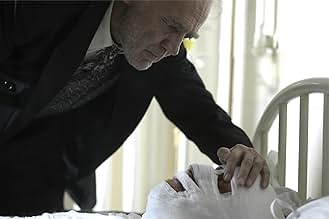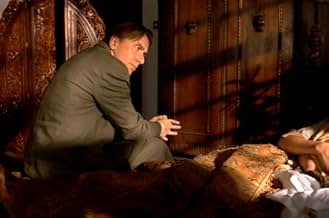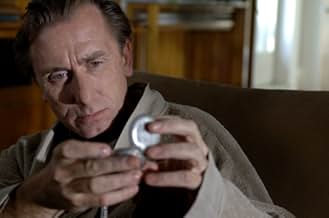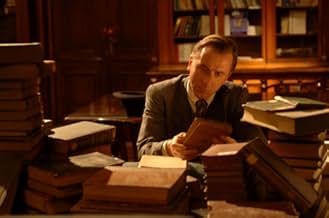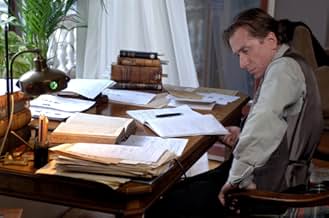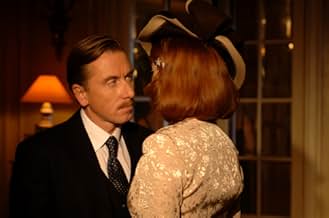AVALIAÇÃO DA IMDb
6,1/10
15 mil
SUA AVALIAÇÃO
Uma história de amor envolta em mistério. Situado na Europa da Segunda Guerra Mundial, um professor é transformado por um acontecimento cataclísmico e explora os mistérios da vida.Uma história de amor envolta em mistério. Situado na Europa da Segunda Guerra Mundial, um professor é transformado por um acontecimento cataclísmico e explora os mistérios da vida.Uma história de amor envolta em mistério. Situado na Europa da Segunda Guerra Mundial, um professor é transformado por um acontecimento cataclísmico e explora os mistérios da vida.
- Direção
- Roteiristas
- Artistas
- Prêmios
- 1 vitória e 1 indicação no total
Dan Astileanu
- Professor
- (as Dan Astilean)
- Direção
- Roteiristas
- Elenco e equipe completos
- Produção, bilheteria e muito mais no IMDbPro
Avaliações em destaque
I was flabbergasted to see that a lot of the comments for this film were negative. The fact that the movie is not of a commercial nature doesn't make it bad, it just makes it less accessible. In this manner, it is just as bad for movies as a science paper is for publications.
Anyway, the film is based on a book of Romanian Mircea Eliade, one that I didn't read. Actually, I didn't read most of Eliade's work for the very reasons people bad mouthed this film. Then I entered adolescence :-P.
The film, though, is a resounding success to me. Not only that it is well done, but at the end of it, it let me wanting to understand more and to read the book. Maybe I will one of these days. As the film is impossible to summarize here, I will get to a quick conclusion.
Bottom line: a heavy feeling film, with a complex script and a lot of philosophical ideas of Eliade's scattered through the story; also some of his personal obsessions: orientalism and the loss of the love of his life. I personally think it was a great movie, but it became a bit confused at the end.
Anyway, the film is based on a book of Romanian Mircea Eliade, one that I didn't read. Actually, I didn't read most of Eliade's work for the very reasons people bad mouthed this film. Then I entered adolescence :-P.
The film, though, is a resounding success to me. Not only that it is well done, but at the end of it, it let me wanting to understand more and to read the book. Maybe I will one of these days. As the film is impossible to summarize here, I will get to a quick conclusion.
Bottom line: a heavy feeling film, with a complex script and a lot of philosophical ideas of Eliade's scattered through the story; also some of his personal obsessions: orientalism and the loss of the love of his life. I personally think it was a great movie, but it became a bit confused at the end.
First of all, i want to express my disgust for people who bash the movie because they didn't enjoy it, or didn't "get it". I accept other people's opinions, it is a free world (most of it anyway), but please stick to just stating your opinion, don't try to change how other people feel about it.
So, in my opinion, first and foremost, if you expect a movie that has drama or action that keeps you glued to your seat, this isn't for you. The plot of the movie has nothing to do with sci-fi, war time action or drama. It is a deeply philosophical movie that appeals to the reality matrix of people, trying to immerse you into some kind of a trance, where you begin to think like the author of the book, and the main character. If you are open minded enough, or a more than average philosophical person, this movie will be quite an experience for you. I know that for me, it was.
I liked it a lot mainly because of the dream/monologue scenes, because they somehow capture the essence of human thought. The doubt, the inner contradictions, the good and the bad sides of the same person. Things that most or all of us do, maybe not in a such out-of-body experience, but it does happen.
I don't want to give to much away, because half of the movie's effect on you has to do with the fact that it catches you off-guard.
So, in my opinion, first and foremost, if you expect a movie that has drama or action that keeps you glued to your seat, this isn't for you. The plot of the movie has nothing to do with sci-fi, war time action or drama. It is a deeply philosophical movie that appeals to the reality matrix of people, trying to immerse you into some kind of a trance, where you begin to think like the author of the book, and the main character. If you are open minded enough, or a more than average philosophical person, this movie will be quite an experience for you. I know that for me, it was.
I liked it a lot mainly because of the dream/monologue scenes, because they somehow capture the essence of human thought. The doubt, the inner contradictions, the good and the bad sides of the same person. Things that most or all of us do, maybe not in a such out-of-body experience, but it does happen.
I don't want to give to much away, because half of the movie's effect on you has to do with the fact that it catches you off-guard.
This is definitely not everyone's cup of tea and has a pretty good chance of becoming a cult film. It explores major philosophic subjects from a dialectic angle, which might confuse pedestrians. In a nutshell: an elderly professor is challenged by his inability to complete his life's work. He is struck by lightning and gets the opportunity to observe life from a meta-human POV. He realizes that intellect, love , morals and reality in general are always ambiguous. IMO one must have some intellectual baggage, life experience and artistic curiosity in order to appreciate the profoundness of this film. Artistically, the film is very stylized and has a rather cold feel to it, something that might deter and alienate the viewer from actually empathizing with any of the characters. However, it's quite clever and stays with you after watching it. I would say that it felt to me a bit like a Darren Aronofsky film combined with Greenaway's Tulse Luper.
Francis Coppola's last mainstream Hollywood film was The Rainmaker and before that it was the critically maligned Jack. Since then the legend of cinema has walked away from being a director for hire. I guess he is still smarting from the failure of his Zoetrope Studios.
In Youth without Youth Coppola turns to European art cinema and not for the first time. His black and white Rumble Fish was heavily influenced by the German Expressionist style.
Tim Roth plays Dominic a 70 year old man in Pre World War 2 Romania, who is struck by lightning and is rejuvenated astounding his doctor (Bruno Ganz).
Dominic is 30 years younger with a regenerated body, he even grows new teeth, he undergoes various tests put to him by his doctors. However it is not only the physical body that has improved, also his mental faculties have gone through a quantum leap. This also arouses the interests of the Nazis once the war erupts.
Of course Dominic hides that he has an alter ego that converses with him and seems to have enhanced powers himself. Also whereas the older Dominic was striving to finish his life's work in the origins of linguistics, now he has the time to research and write further. He speaks many Oriental languages now he can read by just looking at a book.
As the war rages on Dominic escapes to Switzerland to continues his research. In the 1950s, a meeting with a woman called Veronica who reminds him of Laura, a lost love turns the film further on its head. Veronica transmigrates to another soul back in time such as an early disciple of Buddha in ancient India. She keeps going back further in time speaking in ancient languages enabling Dominic to get very near to the first spoken text but at the risk of losing Veronica for good.
The film is a mixture of vision and story. It could easily be something that could had been made by that other American filmmakers Terrence Malick or David Lynch. The film sets its stall out with the European Art-house cinema style, it is not a literal movie as the film feels dreamlike. You do wonder if this is all a dream of Dominic after being struck by lightning.
The film is little known but I was surprised by how accessible it was and how much I enjoyed the film. Coppola has never been afraid to experiment and at times he has misfired badly. Even here some of the scenes set in India does not convince as they are too modern with modern cars driving past. There is even a shot of The Taj Mahal Palace Hotel in Mumbai that crops up in scenes set in Uttar Pradesh.
However this is an intriguing, experimental even a slightly unnerving film. Roth should be given plaudits for drawing the viewer in and keeping them invested in his character.
Youth without Youth shows the world that Coppola is still a master filmmaker.
In Youth without Youth Coppola turns to European art cinema and not for the first time. His black and white Rumble Fish was heavily influenced by the German Expressionist style.
Tim Roth plays Dominic a 70 year old man in Pre World War 2 Romania, who is struck by lightning and is rejuvenated astounding his doctor (Bruno Ganz).
Dominic is 30 years younger with a regenerated body, he even grows new teeth, he undergoes various tests put to him by his doctors. However it is not only the physical body that has improved, also his mental faculties have gone through a quantum leap. This also arouses the interests of the Nazis once the war erupts.
Of course Dominic hides that he has an alter ego that converses with him and seems to have enhanced powers himself. Also whereas the older Dominic was striving to finish his life's work in the origins of linguistics, now he has the time to research and write further. He speaks many Oriental languages now he can read by just looking at a book.
As the war rages on Dominic escapes to Switzerland to continues his research. In the 1950s, a meeting with a woman called Veronica who reminds him of Laura, a lost love turns the film further on its head. Veronica transmigrates to another soul back in time such as an early disciple of Buddha in ancient India. She keeps going back further in time speaking in ancient languages enabling Dominic to get very near to the first spoken text but at the risk of losing Veronica for good.
The film is a mixture of vision and story. It could easily be something that could had been made by that other American filmmakers Terrence Malick or David Lynch. The film sets its stall out with the European Art-house cinema style, it is not a literal movie as the film feels dreamlike. You do wonder if this is all a dream of Dominic after being struck by lightning.
The film is little known but I was surprised by how accessible it was and how much I enjoyed the film. Coppola has never been afraid to experiment and at times he has misfired badly. Even here some of the scenes set in India does not convince as they are too modern with modern cars driving past. There is even a shot of The Taj Mahal Palace Hotel in Mumbai that crops up in scenes set in Uttar Pradesh.
However this is an intriguing, experimental even a slightly unnerving film. Roth should be given plaudits for drawing the viewer in and keeping them invested in his character.
Youth without Youth shows the world that Coppola is still a master filmmaker.
In "Heart of Darkness: A Filmmaker's Apocalypse", a brilliant documentary about making of "Apocalypse Now", Francis Ford Coppola said he was on a learning process while making that film, as he delved into mysteriousness of jungle. In the end, his on-screen works is like a reflection to his own experience. Many years later (20 years to be exact) and 10 years absent from his latest directorial effort (1997's "The Rain Maker"), Coppola tried to do exact same thing like he did in the past.
"Youth Without Youth" is interesting, yet undeniably confusing tale of Dominic Matei (Tim Roth) who is a professor of language and philosophy in early 19th century. His goal is trying to accomplish a research that he claims to be the key of all human's language. But as it turns out, it might be impossible to finish it after all. This research changed his behavior from fascination into obsession. As he lose everything he loves including his fiancé, Veronica (Alexandra Maria Lara), he has nothing left to live on. Many years later, in a blink of World War II, 77-years-old Dominic is on the way to end his miserable life. But then, lightening suddenly stuck at him before he has a chance to do so. The lightening didn't kill him, instead it miraculously rejuvenates his life. Now, he looks like in mid-30's and gave him a supernatural abilities like reading book without open it, mind bending psychic or even developing his own Dr. Jerkyll and Mr. Hyde-like ultra-ego.
After World War II's over, Dominic is traveling throughout the world. He began to look into his research again since now he has a plenty of times to do. But then, he accidentally met his fiancé's dead ringer named Laura (also played by Alexandra Maria Lara). As it turned out, she also happened to be stuck by lightening and develops another supernatural ability which she can speak ancient languages while she slept. Dominic knows right away that it might be an only chance for him to accomplish his unfinished project. But it came with one sacrifice condition, if he decides to stay with her, it might be the way to ending her life.
There's an only one different thing between getting lost in the jungle of Philippines and getting lost in freezing cold city of Romania. And that is "Youth Without Youth" lose its audience's commitment as we keep accompany him to his personal enlightenment (in another words, he wasn't wholeheartedly let us ride along in this time around). With his beyond comprehensible dialogs about metaphysical theory and non-linear stories that keep tangled up like a maze, Youth Without Youth seem to be a failure. No, it's magnificent failure from the master of modern cinema living today.
The cast is another story here, since they served their duty pretty well especially Tim Roth (again, one of the most unused actor living today) who would do all it take to make us believe in the protagonist. And he seemed to really understand what Francis Ford Coppola is trying to achieve. The movie also accompanied by beautiful score (if shamelessly cloying) by Osvaldo Golijov and surprisingly neat cinematography by Mihai Malaimare Jr.
"Youth Without Youth" require a multiple viewing, in order to understand some of its massages. Truth be told, I didn't really get it. Coppola once said in the interview that this story is very personal to him. Well, maybe this film wasn't exactly making for us. It's sure gonna make a lot of people frustrated. For me, I'm just glad that he's back to work again.
"Youth Without Youth" is interesting, yet undeniably confusing tale of Dominic Matei (Tim Roth) who is a professor of language and philosophy in early 19th century. His goal is trying to accomplish a research that he claims to be the key of all human's language. But as it turns out, it might be impossible to finish it after all. This research changed his behavior from fascination into obsession. As he lose everything he loves including his fiancé, Veronica (Alexandra Maria Lara), he has nothing left to live on. Many years later, in a blink of World War II, 77-years-old Dominic is on the way to end his miserable life. But then, lightening suddenly stuck at him before he has a chance to do so. The lightening didn't kill him, instead it miraculously rejuvenates his life. Now, he looks like in mid-30's and gave him a supernatural abilities like reading book without open it, mind bending psychic or even developing his own Dr. Jerkyll and Mr. Hyde-like ultra-ego.
After World War II's over, Dominic is traveling throughout the world. He began to look into his research again since now he has a plenty of times to do. But then, he accidentally met his fiancé's dead ringer named Laura (also played by Alexandra Maria Lara). As it turned out, she also happened to be stuck by lightening and develops another supernatural ability which she can speak ancient languages while she slept. Dominic knows right away that it might be an only chance for him to accomplish his unfinished project. But it came with one sacrifice condition, if he decides to stay with her, it might be the way to ending her life.
There's an only one different thing between getting lost in the jungle of Philippines and getting lost in freezing cold city of Romania. And that is "Youth Without Youth" lose its audience's commitment as we keep accompany him to his personal enlightenment (in another words, he wasn't wholeheartedly let us ride along in this time around). With his beyond comprehensible dialogs about metaphysical theory and non-linear stories that keep tangled up like a maze, Youth Without Youth seem to be a failure. No, it's magnificent failure from the master of modern cinema living today.
The cast is another story here, since they served their duty pretty well especially Tim Roth (again, one of the most unused actor living today) who would do all it take to make us believe in the protagonist. And he seemed to really understand what Francis Ford Coppola is trying to achieve. The movie also accompanied by beautiful score (if shamelessly cloying) by Osvaldo Golijov and surprisingly neat cinematography by Mihai Malaimare Jr.
"Youth Without Youth" require a multiple viewing, in order to understand some of its massages. Truth be told, I didn't really get it. Coppola once said in the interview that this story is very personal to him. Well, maybe this film wasn't exactly making for us. It's sure gonna make a lot of people frustrated. For me, I'm just glad that he's back to work again.
Você sabia?
- CuriosidadesLanguages spoken in the film are English, French, Italian, Mandarin, German, Russian, Latin, Armenian, Sanskrit, Egyptian (not Arabic), Babylonian and a little Romanian. The ancient Sanskrit, Egyptian and Babylonian are authentic, researched in ancient texts and manuscripts by a team of expert linguists. The film also includes an artificial, "made-up" language, done with such integrity that it could provide the rudimentary basis of a new language.
- Erros de gravaçãoThe panoramic x ray shown when the teeth of the main character start to change is obviously from a 12 years old person as are clearly visible temporal molars (that are not present in adults) and their adult successors.
- Trilhas sonorasMiddle Village
Written by Lev Zhurbin (as Lev 'Ljova' Zhurbin)
Performed by Lev Zhurbin (as Lev 'Ljova' Zhurbin) on viola and Balogh, Kálmán (cymbalom)
Principais escolhas
Faça login para avaliar e ver a lista de recomendações personalizadas
Detalhes
- Data de lançamento
- Países de origem
- Central de atendimento oficial
- Idiomas
- Também conhecido como
- Youth Without Youth
- Locações de filme
- Empresas de produção
- Consulte mais créditos da empresa na IMDbPro
Bilheteria
- Orçamento
- US$ 5.000.000 (estimativa)
- Faturamento bruto nos EUA e Canadá
- US$ 244.397
- Fim de semana de estreia nos EUA e Canadá
- US$ 28.550
- 16 de dez. de 2007
- Faturamento bruto mundial
- US$ 2.624.759
- Tempo de duração
- 2 h 4 min(124 min)
- Cor
- Mixagem de som
- Proporção
- 2.35 : 1
Contribua para esta página
Sugerir uma alteração ou adicionar conteúdo ausente







